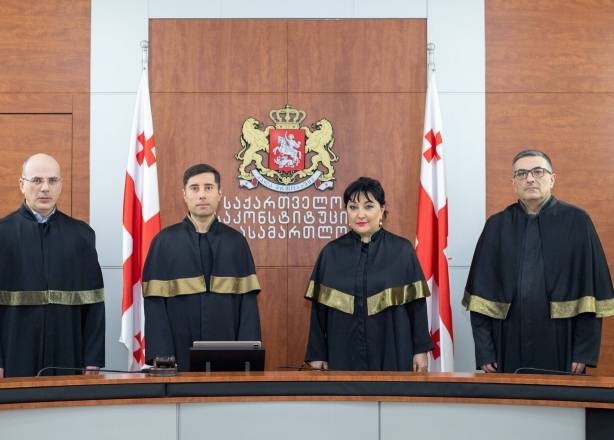On October 8, 2025 the First Board of the Constitutional Court of Georgia partially upholds the Constitutional Claim №1462 (“N(N)LE “Unity 2013” v. the Parliament of Georgia”).
On October 8, 2025 the First Board of the Constitutional Court of Georgia partially upholds the Constitutional Claim №1462 (“N(N)LE “Unity 2013” v. the Parliament of Georgia”).
Disputed norms regulate the grounds for applying a provisional measure and define, as one of such measure, the prohibition of certain actions by the defendant. They also establish the procedure for deciding on an application for provisional measures without notifying the defendant.
The claimant, on the one hand, argues that the prohibition of the right to strike, based on the norms of the Civil Procedure Code, fails to meet the formal requirements established by the Constitution. On the other hand, the claimant finds it problematic that, under the disputed norms, the right to strike may be restricted - as a provisional measure - for metro train drivers, prior to a determination on the lawfulness of the strike. In addition, the claimant considers that an application for the prohibition of a strike should be examined through an oral hearing, as the issue requires an assessment of a range of factual circumstances and entails in an intensive interference with individual rights.
The defendant argues that the exercise of the right to strike by metro train drivers effectively results in the complete paralysis of the metro system, which significantly disrupts transportation and hinders both the routine movement of individuals and prompt mobility of essential services. Accordingly, under the disputed norms, maintaining the operation of the metro system serves the aim of protecting public safety, life, and health - interests that may justify the restriction of the right to strike as guaranteed by the Constitution of Georgia. According to the defendant, considering an application to prohibit a strike without an oral hearing helps avoid artificial court overload and ensures the effective enforcement of the judgement delivered on the case.
The Constitutional Court of Georgia found that, in the present case, the application of provisional measures aimed at ensuring the application of the right to strike in accordance with the procedures and conditions established by the Organic Law. Moreover, the measure did not introduce any new rules or conditions regarding the exercise of the right to strike beyond those already provided for by the Organic Law of Georgia “Labour Code of Georgia.” Accordingly, the formal constitutional requirements for the restricting the right to strike were not violated on the basis of the disputed norms.
The Constitutional Court emphasized that the constitutionality of how metro train drivers exercised their right to strike under substantive law was not the subject of review in the present case. However, in relation to the claims raised in the constitutional complaint, the Court had to assess the constitutionality of temporarily restricting the exercise of a potentially unlawful strike through provisional measures.
The Constitutional Court found that the disputed procedural measure aimed to prevent potential harm resulting from an unlawful strike. At the same time, under the existing legislative framework, the procedural rules governing provisional measures required the judge to be guided by the necessity requirement, to assess the proportionality of the measure, and to apply it only if it was presumed that the claim would be granted and that the protected interest outweighed the harm resulting from the restriction of the right. Accordingly, the Constitutional Court held, based on the disputed norms, temporary restriction of the right to strike (before the determination of the lawfulness of the strike) did not violate the requirements set out in Article 26(3) of the Constitution of Georgia.
The Constitutional Court of Georgia also assessed the constitutionality of considering an application to prohibit the right to strike without holding an oral hearing. According to the Court, although the ex parte consideration of such applications - without notifying metro train drivers – are justified by the need for an immediate resolution of the matter, this interest does not exist in all cases. Article 193 of the Civil Procedure Code imposed a blanket prohibition on considering such applications with the participation of the respondent. However, where there sufficient time exists to conduct an oral hearing and the resolution of the issue requires the establishment of factual circumstances, such a restriction was deemed unconstitutional in relation to Article 31(1) of the Constitution of Georgia.
The Subject of the Dispute: a) The constitutionality of Article 191(1) and Article 198(2) (b) of the Civil Procedure Code of Georgia in relation to Article 26(3) of the Constitution of Georgia; b) The constitutionality of Article 193 of the Civil Procedure Code of Georgia in relation to Article 31(1) and (3) of the Constitution of Georgia.


